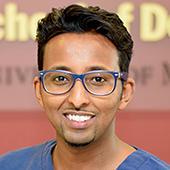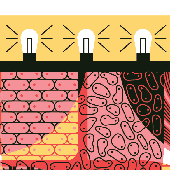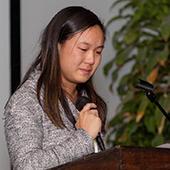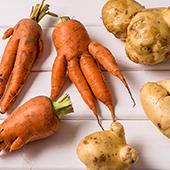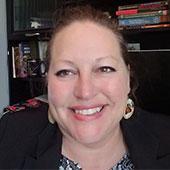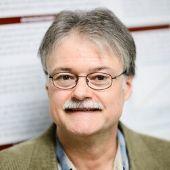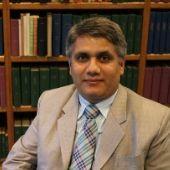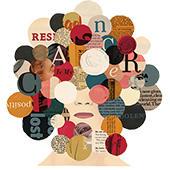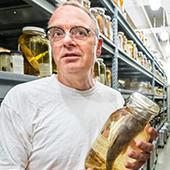- Features: Driven to serve those most in need; Stem cell ingenuity; Healing words; Wasted produce; Starting strong.
- People: David Redish and Sophia Vinogradov will lead a $15 million National Institute of Mental Health grant researching better ways to treat psychosis; and more.
Driven to serve those most in need
For young Elmi Ibrahim, the sprawling refugee camp in the Kenyan desert was his entire world for eight years. After his father was killed in the civil war in their home country of Somalia, his mother fled to Kenya with Ibrahim and his four siblings. At age 10, Ibrahim was plagued by an infected molar, which he suffered with for a full year before the family was able to migrate to the United States. Today, as a recent School of Dentistry graduate and father, he has carved out time to improve the oral health of underserved communities in the Twin Cities.
Stem cell ingenuity
In 2000, when the University of Minnesota launched its Stem Cell Institute, a small group of researchers came together to map a new realm of science. Twenty years later, the U of M’s Stem Cell Institute—the first interdisciplinary, academic institute in the United States—has grown greatly in size and impact. Today, 53 researchers from 22 departments across the University are making discoveries that bring hope to patients facing some of the world’s most complex diseases.
Healing words
Family medicine resident Jenny Zhang had never considered herself a writer. But last fall, Zhang brought hundreds of her colleagues and faculty to tears with her wrenching story of caring for a cherished patient through pregnancy to its tragic, traumatic end. Helping her patient deliver a stillborn baby rattled Zhang to her core, and she still struggles with grief and self-doubt in the wake of it. From start to finish, her story slam participation was tough but profoundly worthwhile, much like medicine itself.
Wasted produce
While the novel coronavirus has disrupted the food supply chain in an unprecedented way, leaving fields full of fresh produce to rot, the problem of food waste itself is anything but new. Before the arrival of COVID-19, the Food and Agriculture Organization of the United Nations reported that about 1.3 billion tons of food went uneaten each year. It was during a visit to a local farm that two University of Minnesota researchers saw one opportunity to reduce this waste.
Starting strong
The University of Minnesota is doubling down on the immense potential of brain adaptability, bringing together a team of clinicians and researchers to form its new Masonic Institute for the Developing Brain. It’s designed to capitalize on the most sensitive periods of brain development in a person’s life: the first 1,000 days and adolescence. See examples of the kind of work the institute will perform to keep kids’ brains at their best.
People
David Redish and Sophia Vinogradov will lead a $15 million National Institute of Mental Health grant researching better ways to treat psychosis; Timothy O'Connell was recently awarded a five-year NIH grant to study the mechanisms by which omega-3 fatty acids benefit heart health; Sarah Greising is part of a $1.5 million multi-PI grant from the Department of Defense to evaluate novel regenerative rehabilitation solutions; 2020-21 Interdisciplinary Doctoral Fellowship recipients; U in the News features highlights of U faculty and staff cited in the media. People
U of M Affinity Groups
Affinity groups help provide community and support for underrepresented faculty and staff. A list of affinity group contacts is available on the Equity and Diversity website.
Mental health resources available
All University of Minnesota employees, along with their spouse and children, can use the Employee Assistance Program to get counseling and consultation on a variety of concerns, including mental health and stress. The Office of Human Resources also has a site with health and well-being resources, including online mental health care, stress management coaching, and financial counseling.
June 9 - Meeting of the Faculty Senate
The Faculty Senate will meet to vote on President Gabel’s recommendations as they pertain to Section 4.5 of Board of Regents Policy: Faculty Tenure. The meeting will be livestreamed on YouTube, 11 a.m.-1 p.m. Docket materials will be posted on the University Senate website when available.
Starting June 11 - Teaching Topics Happy Hours
The Academy of Distinguished Teachers will host the virtual Teaching Topics Happy Hour every other Thursday, starting June 11, 4-5 p.m. The purpose is to have an opportunity to de-stress and discuss a topic or theme related to teaching in this changing, challenging time. The June 11 event will focus on instructors’ experiences with, and suggestions for, motivating students in an online environment. Reminders with the topic of each session and a link will be sent to those who RSVP.
New Google Chat available systemwide
The new Google Chat recently became available for all students, faculty, and staff systemwide. No action is required as a result of this change, unless you wish to migrate any group messages from classic Hangouts Chat to the new Google Chat. Learn more about Google Chat and how to migrate group messages.
How to practice cyber security at home
As much of the University community continues to work remotely, University Information Security has created a list of actions you can take to ensure your network, devices, and software at home are secure.
CIDRAP proposes strategic approach to COVID-19 testing
While SARS-CoV-2 testing plays a critical role in controlling the COVID-19 pandemic, tests alone are just one element of an effective testing strategy. “Smart testing for COVID-19 virus and antibodies,” the third report in a multipart series titled, "COVID-19: The CIDRAP Viewpoint," proposes a SARS-CoV-2 smart testing framework that helps ensure that the right test is available to the right person at the right time, with timely test results guiding actions that minimize illness, deaths, and disease spread.
Patient-turned-researcher teams up with her doctor to advance pioneering microbiota transplant program
For more than a year, debilitating gastrointestinal symptoms waylaid Amanda Kabage’s life, occurring so frequently that leaving the house became nearly impossible. The culprit: recurring Clostridium difficile, or C. diff, a bacterial infection of the gut. She read about a new treatment that was showing promise: an intestinal microbiota transplant. At the time, only a few physicians in the U.S. had FDA approval to do microbiota transplants. As luck would have it, one of them worked at the same place Kabage did: the University of Minnesota.
Health In All Matters podcast - Episode 10: Wake-Up Call
Looking back and looking forward are inescapable actions even in the midst of a pandemic: What did we learn, or not, from the past and what will be different going forward? The last episode of the first series of the Health In All Matters podcast explores the history and the science of zoonotic pandemics and how COVID-19 could be a wake-up call for a brighter future.
Researchers study new, faster test to detect COVID-19 strains
Mark Osborn, assistant professor in the Department of Pediatrics, and colleagues are working to develop a faster diagnostic test for COVID-19 that does not require specialized reagents or infrastructure and may help detect different strains of COVID-19.
Open-source release allows Coventor to be produced worldwide
The design for a low-cost ventilator created at the University of Minnesota has now been released as open-source, giving manufacturers around the globe a way to help supply care providers during the coronavirus pandemic. The Coventor is a compact, first-of-its-kind alternative to traditional ventilators, giving physicians another means to increase the oxygen levels in patients’ blood.
Buying animals for meat processing
Buying meat in bulk can help you save money over time if you and your family regularly eat meat. Recent events have led more consumers to consider buying beef, pork, lamb, and other meats through local farmers and butchers. Extension's livestock team has created charts to help consumers make sense of the bulk meat buying process.
Research Brief: Stay-at-home orders may decrease COVID-19 hospitalizations
New research from the University of Minnesota’s Carlson School of Management shows an association between the implementation of statewide stay-at-home orders and a reduction in the number of people hospitalized for COVID-19. Additional Research Briefs include “How mixed messages complicate mate selection.”
U of M featured virtual events
June 5 - From the White House to U: Interpreting News about the Labor Market
June 9 - Afro-Asian Enchantment
June 10 - Webinar: Mindful Parenting
June 10-11 - Facilitating Intercultural Learning in Globally Diverse Classrooms
June 11 - Jan Malcolm and Responding to COVID-19 in Minnesota
June 13 - WineFest@Home
June 17 - Trust Issues: Communicating research during a pandemic
Peterson's impact as a leader to be seen for years to come
Around the time Clarke Peterson was about to graduate from East Grand Forks High School, coach Steve Gust had just taken over and the U of M Crookston Golden Eagles had increased their win total from 1 to 14 wins. Peterson was excited about the opportunity that playing at the University of Minnesota Crookston and for Coach Gust presented him.
Transforming child welfare
Jeri Jasken has been hired as the director of the new Aabinoojiiyag-Wakhanheza Un Thantanhanpi—For all the Children—Sacred Being: Tribal Training and Certification Partnership. This new initiative of the U of M Duluth Center for Regional and Tribal Child Welfare Studies is designed to educate and train all child welfare workers in Minnesota to provide culturally responsive services to American Indian families.
Empowering youth
Biomedical sciences faculty members Anna Wirta Kosobuski and Richard Melvin have developed informational resources geared for youth. "COVID-19? Answers for Kids" and "A Kid's Quick Guide to Stopping COVID-19" present easy ways to stop the spread of the new coronavirus. The resources are available in downloadable, shareable PDF formats.
Trucking and supply chains during COVID-19
Professor of economics and management and Center for Transportation Studies research scholar Stephen Burks is weighing in on the role of trucking and supply chains during the COVID-19 pandemic. In recent days, Burks has been quoted in the Star Tribune, and has appeared on Road Dog News and Transport Topics Radio.
Aanerud heads east through National Student Exchange
Arts management student Evan Aanerud ’20 was studying away in Massachusetts and had a dream summer internship lined up on Broadway. Then COVID-19 hit. Like other 2020 graduates, Aanerud faces an uncertain chapter unlike what he’d hoped for this spring. But he’s not giving up. He shares his story in the Star Tribune’s “Tomorrow Together” video feature.
The effect of COVID-19 on South Asian economies
Satis Devkota, assistant professor of economics and management, recently spoke with South Asia Time on the impact of COVID-19 on South Asian economies. An expert on health economics, growth and development, applied econometrics, and applied microeconomics, Devkota researches socioeconomic inequality in health and education, agricultural productivity and poverty, and low- and middle-income countries.
Learning Matters: How do innovators sustain energy in a season of challenge?
Chancellor Lori Carrell writes in a recent blog post, that while it’s too early to look back on COVID-19 and identify lessons learned, now is the time to think about how we are learning to endure. Endurance, says Carrell, takes intentional design, creativity, and adaptability—competencies that characterize the UMR community, and that we now need to learn to apply to our own lives.
Emerging health technologies pathway
Conrad Cruz works as a clinical biomanufacturing operator to treat genetic disease, produce vaccinations, and advance research in molecular biology treatments. His capstone experience at UMR taught him research skills and to become comfortable with uncertainty.
Join the Diversity Community of Practice
The U of M Diversity Community of Practice (DCoP) is a grassroots community of faculty and staff from collegiate and administrative units across the Twin Cities campus that meets monthly. Its purpose is to develop and leverage personal, professional, and technical expertise, creating innovative strategies to achieve equity and diversity goals at the University of Minnesota Twin Cities.
Serving Native communities during COVID-19
The University of Minnesota Community-University Health Care Center (CUHCC) serves approximately 460 American Indians, half of whom identify as Ojibwe. Located in the heart of the Minneapolis American Indian Corridor, CUHCC is at the epicenter of one of the largest concentrated urban American Indian populations. Learn more about the ways COVID-19 is impacting indigenous patients, and how CUHCC is meeting community members where they are.
A bridge to better mental health
In 2018, the Carlson School became one of the first business schools in the country to add an in-house mental health resource for students. While this isn’t the only or the largest mental health initiative the University has taken on, it represents a new approach to providing students more integrated support during a critical time in their lives.
Interior design adapts to remote teaching and learning
When the decision was made to shift classes to remote learning, College of Design faculty, staff, and students undertook one of the biggest teaching and learning challenges to date. As spring semester wraps up, interior design instructors share how they adapted their classes to remote learning, the challenges they faced, and what they learned.
Two U of M students named 2020 Astronaut Scholars
U of M Twin Cities College of Science and Engineering students Marcos Zachary and William Zunker have been named 2020 Astronaut Scholars. The prestigious, competitive scholarship, initiated by the Mercury-7 astronauts, is awarded annually to outstanding sophomores and juniors who intend to pursue research-oriented careers in mathematics, engineering, and the natural and applied sciences.
Reeling in the centuries
There are around 1.4 million licensed anglers in Minnesota, and they are surrounded by some 4,500 good fishing lakes. Whether you’re one of those 1.4 million, or you simply have a fascination with fishes, you can take some local pride in the fishes collection at the Bell Museum. The collection dates back to the late 19th century, with more than 41,000 cataloged lots.
